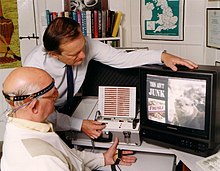
Back علم النفس العسكري Arabic Ваенная псіхалогія Byelorussian Военна психология Bulgarian دەروونناسیی سەربازی CKB Militärpsychologie German Psicología militar Spanish روانشناسی نظامی Persian Psychologie militaire French सैनिक मनोविज्ञान Hindi Vojna psihologija Croatian
The examples and perspective in this article may not represent a worldwide view of the subject. (March 2014) |
| Part of a series on |
| Psychology |
|---|
Military psychology is a specialization within psychology that applies psychological science to promote the readiness of military members, organizations, and operations.[1] Military psychologists provide support to the military in many ways, including through direct clinical care, consultation to military commanders, teaching others and supporting military training, and through research relevant to military operations and personnel. Military psychology as a field has been growing since the early 20th century, evidence that the demands and needs for psychological clinical and operational application is continuing to grow steadily.[1] There are many stressors associated with military service, including exposure to high-risk training and combat. As such, psychologists are critical support components that assist military leaders in designing appropriate training programs, providing oversight to those programs, and assisting military members as they navigate the challenges of military training and their new lifestyle. Military psychology covers a wide range of fields throughout the military including operational, tactical, and occupational psychology.[2] Gender differences between military-trained personnel who seek mental health assistance have been extensively studied. Specific examples include post traumatic stress disorder (PTSD) associated with combat, or guilt and family/partner difficulties accompanying extended or frequent deployments due to separation. Clinical providers in military psychology are often focused on the treatment of stress, fatigue, and other personal readiness issues.[2] Previous wars such as the Korean war, Vietnam war, and WW 2 provide great insight to the workings and practices of military psychology and how the practices have changed and assisted the military over the years.[3]

- ^ a b Kennedy, Carrie H.; Zillmer, Eric A. (30 June 2022). Military Psychology: Clinical and Operational Applications. Guilford Publications. ISBN 978-1-4625-4994-8.
- ^ a b The Oxford handbook of military psychology. Janice H. Laurence, Michael D. Matthews. New York: Oxford University Press. 2012. ISBN 978-0-19-539932-5. OCLC 713834813.
{{cite book}}: CS1 maint: others (link) - ^ Hacker Hughes, Jamie; McCauley, M; Wilson, L (9 November 2018). "History of military psychology". Journal of the Royal Army Medical Corps. 165 (2): 68–70. doi:10.1136/jramc-2018-001048. ISSN 0035-8665. PMID 30415213. S2CID 53286244.
© MMXXIII Rich X Search. We shall prevail. All rights reserved. Rich X Search